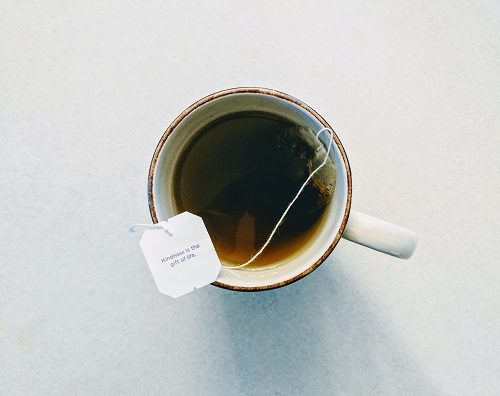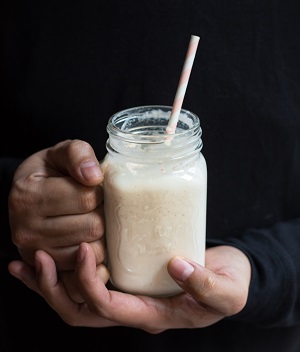This is the first in our “Immunity Series” of podcasts. In this episode we have a discussion about how drinking teas can help boost our immune systems. Tune in to learn a few interesting facts about herbal teas vs. the common tea varieties.
We invite you to listen and share your perspectives with us too. Send us a recorded message through Speakpipe. We may use your message in an upcoming episode. Leave your name if you would like it to be noted during the podcast. Leave an email address if you would like a personal response or feel free to use the contact form.
Listen right here:









Related blog article: Drinking Teas for Your Immune System

Note: Future “Immunity Series” podcasts will not only include foods that boost our immune systems but various lifestyle practices that we can implement as well.
Photo by Drew Taylor on Unsplash
Discussion transcript for Immunity Series – Drinking Teas:
Shonda (00:00): So we each decided on a topic and, uh, you chose tea and I chose water this week. We did do a little research. Uh, we want it to bring you some accurate facts about tea and water. So let's talk about what we learned this week.
Patryce (00:20): Super. I was surprised at how much I actually didn't know about one of my favorite drinks, tea. And so this was pretty, I, pretty revealing for me, just finding out some more details about tea and there's still, I'm sure a lot more to learn, but, uh, I did find out that tea is the most, second, most popular beverage in the world from a world standpoint, only second after water and, uh, in the U S it's not as popular as tea is around the world. Around the world people drink a lot more tea than we do in the U S
Shonda (01:01): Wow. Yeah. I usually just go for tea, hot tea, something peppermint. Usually if my stomach feels unsettled or want to have something to settle it and, you know, make it feel comforting. Um, I always go, I don't drink cold drinks. I always go for room temperature or hot.
Patryce (01:22): Wow. That's yeah, that's really good insight about how we have different tea habits, drinking of tea habits. And like you just point out, you prefer to drink it warm or hot tea. And in the U S a cold, he is very popular, cold ice tea, but your, your habits are more similar to around the world where they really do drink more hot tea or warm tea, and specifically herbal teas and Shonda. That's what I, I didn't really understand. There was a difference between herbal teas and non herbal, other than I prefer herbal teas. And I assume that they are better for you and good for you. And, and I did find that out that herbal teas, they provide a lot of nutrients and all teas are, a good source of hydration, but on top of that, the herbal teas provide the nutrients. And the main thing is that herbal teas are from an infusion of various non tea plants. So that prompted me to find out, okay, non tea plants. So that, I've found out that tea...the non honorable teas come from the two main types of tea plants. So there are tea, specifically tea plants, so that the non herbal.
Shonda (02:49): Yeah, that that's, that's very new information. I never, I never thought about there being a tea plant, you know, tea plants versus... Because all the teas that I drink are herbal teas, or like made with peppermint, or mint or things like that. And those obviously are not, um, tea plants. And then something else just came to mind is ... so the tea plants are really the ones that have the caffeine in them.
Patryce (03:18): True. Exactly. You, you know, you've heard probably there's black tea, green tea, white teas, and these all have caffeine. And I think they have different degrees of caffeine, but the bottom line, like you said, they do have caffeine. Whereas the herbal teas made from the non tea plants, non tea plants like flowers, herbs, spices, and other roots generally don't have caffeine. They're caffeine free.
Shonda (03:50): That's really good. Cause I, I do think of, uh, um, recently I've I've have you heard of, um, Pau D' Arco? I think that's how you pronounce it. It's like pine bark tea actually. Is that one of your research?
Patryce (04:05): It is not one, but I have had that at one time.
Shonda (04:09): I go for that one for respiratory. That's, I would say that that's one of my favorite to infuse, um, as a tea.
Patryce (04:19): Oh, wow. Yeah, I haven't done any research on that one, but I have, I have tasted it before and it's a more earthy tea. I found it very refreshing. It just a very earthy tea, but good to know that can help with respiratory. But one tea you did mention earlier that I did look at was peppermint tea. That's an fantastic tea, and you can, in America, we usually just buy our teas and tea bags, but also you can buy the peppermint itself and steep it to make the tea that way. And either way, the peppermint tea is a wonderful tea, and it has some benefits such as improving your, your, um, your energy, your power, and also enhancing breathing functions. And it's also been attributed to a relaxation of your bronchial muscles, increased brain oxygen levels, and, um, also, uh, muscle relaxing benefits as well. And I think a lot of people, I think you mentioned it, it can help ease your indigestion. So maybe after an especially heavy meal or something, didn't agree with you after having that meal, you might have some peppermint tea.
Shonda (05:40): This is so interesting because I think that we want to promote real food and real drinks. And so we want to share today that tea is a real drink and no matter which one we choose, it can be beneficial us in some way, you know, it's providing some nutrient or some benefit to our diet,
Patryce (06:04): exactly.
Shonda (06:04): So carry on.
Patryce (06:06): Well, and now that you brought that up, because it can be so beneficial, I also was reminded that we don't have to just make the tea and have a cup of tea, but you can also add the tea to your oatmeal or your smoothie or your soup broth and marinades. So the reason why I thought that was exciting, like you said, because of the nutritional benefits, you don't have to just drink it. You can add it, incorporate in to the preparation of your foods. So that was pretty exciting, but also, um, I have the top five that I picked out. There are lots of verbal teas, but there were five that I honed in on. And another one I'm sure you may have heard of is Chamomile, right? A lot of people drank Chamomile tea, and that is one that is, it generally has a very calming effect.
Patryce (07:00): So it might be something you want to drink before you go to bed and can actually help with your sleep, getting to sleep, and a better sleep. And then there's there, there's another tea called Burdock root. And that was interesting to me because I've actually eaten the Burdock root in a sandwich or a hand roll that they used to serve in Singapore. And Southeast Asia is pretty popular to have dishes with rice or hand roll made with a black or red rice. And then Burdock was one of the different items that you could put in it. But burdock root tea has a long list of health benefits like detoxifying the body, um, because it helps with healing the liver and preventing some chronic diseases, as well as reducing inflammation and just boosting the immune system overall, uh, that includes your respiratory infections, helping to heal those with the burdock root tea and also improving your hair health and stomach disorders. So there is like a lot of benefits to this particular tea made from the Burdock root.
Shonda (08:10): Hmm. Wow. So what does the burdock root tastes like when you had it in those, you know, sandwiches or wraps? Is it bitter?
Patryce (08:19): No, I didn't think it was bitter. It's definitely not. It's more on the savory side and it was like parsnip, if you can think of that, it's very interesting. It was cut up like, you know, how you get the match? What do you call them? The carrots. Those little sticks.
Shonda (08:40): Oh, like match sticks. Oh, okay. So is it a Burdock a root?
Patryce (08:46): It is burdock root.
Shonda (08:48): Okay. I was thinking more like a green plant.
Patryce (08:51): No, it's a root. So it's like a more white or off white color. So yeah, I haven't really seen it here, so I don't, it didn't have like a very pronounced taste. More on the mild side, but it was very tasty complemented with the rice, the carrots, even cucumbers, all those good things. So that was ... I'm going to be in search of Burdock root tea. I haven't found any or looked for it, but it will be in the feature. And then the third tea is ginger. And I think many of us are familiar with ginger, with our cooking and, uh, also sucking on ginger, if you've ever... People sometimes when you're pregnant, you're suffering from morning sickness. And just anytime you feel nauseated, ginger is a very good go-to. So ginger tea could be something that can help greatly with that morning sickness or being nauseated or motion sickness tooo ginger sipping on some ginger tea can help with those, um, times when you're suffering from those things. And also, I didn't realize it can help ease your period pains. So it also supports our immunity overall. And there are studies that show that can help protect against cancer, heart disease, as well as type two diabetes. So that was all very, very interesting and exciting ways that we can prevent ... help with prevention of diseases.
Shonda (10:23): Right. And let's remind our community that we're talking about. Um, we're just talking about tea and water today, but the goal is to use all these foods together in combination to, uh, help build our immune system. So we, we can't, uh, ever just look at one specific thing and say, that's going to be our cure. We're talking about real food, real drinks and the lifestyle, which means that we want to incorporate all these things into healthy living. [Great.] So go ahead. I just wanted to let everyone remind everyone about that.
Patryce (11:00): Yeah, that's a great reminder. There's a fourth tea. Hibiscus tea is another super tea to drink, and many of us probably are familiar with the Hibiscus plant. We actually have one in our front yard that has those beautiful flowers. Well, this beautiful plant, you can drink the Hibiscus tea from those, um, from, from the hibiscus plant, you can get Hibiscus tea and it tastes somewhat like cranberries.
Shonda (11:33): Wow. Are you saying that any Hibiscus plant, I can go make into a tea that there isn't like a specific one that is, you know, used or I don't know, like some mushrooms that grow wild they're poisonous and some, you know, are beneficial. So ...
Patryce (11:50): That's a great point. Shonda. I would not, I'm not advocating we go out and get the Hibiscus leaves from our plants outside that's... We don't know. That's a good point. I have always purchased my Hibiscus tea. And, um, I do know people who have purchased the actual, um, plant. Oh, well, they've the leaves, the dried leaves. You can do that, but yes, make sure you check that out. You purchase it, uh, from a, uh, a reliable source and yeah, I would not just go and harvest it from our own plants. That's a very good point. Yeah. We'll have to look that up. But from the high biscuits, um, leaves that you've purchased or the tea bags, you, um, there are some benefits from drinking that tea and some of them are that they're rich in antioxidants and may boost your good HDL levels and lower, bad LDL cholesterol and triglycerides for people with diabetes. And it also helps to protect the liver and promote weight loss. And the last cool thing I wanted to mention is I read that it helps support immunity through its antibacterial potency. I did not realize that.
Shonda (13:09): No, no, I didn't at all. And, you know, I liked the sweet taste of, of, uh, Hibiscus tea. I think it has like a little tangy -ness or whatever to it. And normally when I'm having tea, I, uh, I do use some, um, some Stevia in my tea, like one or two drops. Uh, I don't know, I just don't go for sugar. But it's, it has a really nice balance with that little bit of sweetness and, you know, and the, yeah, it's kind of tangy, I guess it's tropical, you know, it was kind of citrusy
Patryce (13:44): And some people have compared it to be similar to cranberries, but, um, I don't think it's overly tart, but it does remind you a bit of that, but it's a very, it's a lovely tea to drink. So that tea and the there's another tea called Rooibos commonly referred to as red or red Bush tea. So instead of the Rooibos' name, you might just see it also advertised as red, Bush tea or red tea. And it comes from the leaves of a shrub native to South Africa. And it's another tea, another herbal tea that's loaded with antioxidants as well as anti inflammatory compounds. And it has been linked to uh bone health protection and improved digestive health as well as obesity prevention. Yeah. And yeah, like you, I'm glad you gave us that reminder earlier that we're not saying, Oh, you just drink these teas and it's a cure all no, but it's to compliment the overall lifestyle of healthy eating and choosing to be intentional about what we decide to eat and drink. One other thing it said about this tea was that in small amounts, they have found that to contain iron calcium, potassium, copper and magnesium, zinc and mag, well, just a lot of minerals. So that's pretty cool.
Shonda (15:19): Yeah. I think that's something surprising about all the herbal plants and especially when they are infused in water. I mean, they are very, I guess, potent, they're powerful, they're powerful antioxidants that do go a long way with, um, such little bit, you know, small amounts do go a long way.
Patryce (15:43): That's a very good point. And like you said, infused in water. So that's why I'm excited to learn more about, well, what water is the best water to drink, or what should I be looking into when I consider the water that I'm drinking?
Shonda (15:57): So that wraps up our discussion about tea. Next time we will be discussing water and how it can help boost your immune system.
GET STARTED WITH THE REAL FOOD AND DRINKS LIFESTYLE
Enter your name and email address below and I'll notify you weekly of podcasts, website posts, recipes, videos, and events that have been shared during the week because you won't want to miss these.



